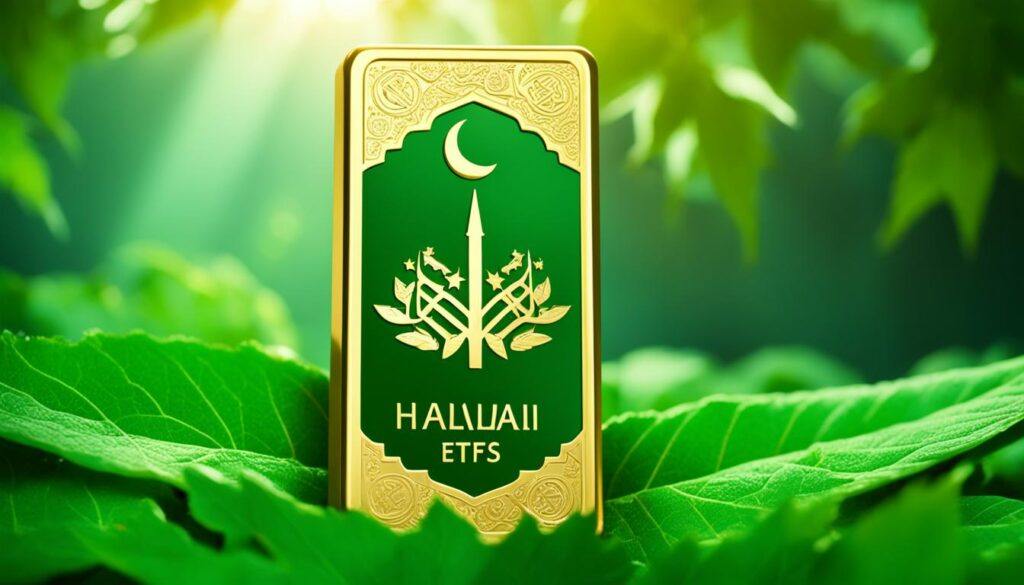Remarkably, the gold market occupies a staggering financial territory with over $10 trillion worth in circulation globally, yet many Muslim investors question where they stand in this gleaming landscape. My aim is to illuminate the intersection where Gold ETFs in Islamic finance converge, shedding light on the Islamic perspective on Gold ETFs and their alignment with Islamic rulings on Gold ETFs. In the vast realm of investment choices, navigating the Sharia-compliant avenues can be particularly challenging, especially when it comes to the nuanced laws governing gold trading. However, I’ve come to understand that the allure of gold is not just in its luster but in its potential as a halal investment vehicle for those respecting Islamic finance principles.
Key Takeaways
- Gold ETFs present a unique opportunity in Islamic finance to invest in gold without holding the physical asset.
- Physical gold’s intrinsic value and fungibility make it a halal exception to the prohibition on speculative trading.
- Services like BullionVault provide platforms for halal gold trading that align with Islamic principles.
- Sharia-compliant Gold ETFs, such as SPDR Gold MiniShares Trust (GLDM), offer adherents a permissible form of investment.
- Low expense ratios contribute to the attractiveness of physically-backed Gold ETFs in the Islamic investment landscape.
- It is crucial to choose Gold ETFs that are transparent and fully backed by physical gold to maintain Sharia compliance.
Understanding Halal Investment in Islamic Finance
As a professional copywriting journalist with expertise in Islamic finance, I recognize the significance of adhering to Sharia principles for Halal investing. It’s fundamental for investors seeking to align their portfolios with these values to opt for avenues that ensure compliance with Islamic law. Among various investment options, Gold ETFs have emerged as a popular choice. However, the key is to focus on investing in Halal Gold ETFs, which circumvent prohibited businesses and strictly adhere to Sharia laws against uncertainty and gambling.

What Makes an Investment Halal?
Halal investing is unique in its approach to financial growth. To qualify as Halal, an investment needs to steer clear of prohibited industries and practices. This precludes involvement in industries such as alcohol, tobacco, gambling, and those associated with adult entertainment or pork products. Moreover, it cannot involve interest (riba), excessive uncertainty (gharar), or gambling (maisir). The sharing of profit and loss, rather than guaranteeing a fixed return, is a requirement, instilling a sense of joint venture and shared outcomes between investor and investee.
The Case for Gold in Islamic Finance
In my exploration of asset classes that meet Halal criteria, I find that Gold has historically held a prestigious position. Notably, in Islamic finance, it’s considered a stable and permissible investment capable of protecting wealth and hedging against inflation. Physical gold, in the forms of coins and bullion, embodies the tangible asset preference in Sharia-compliant investing. The discussion, though, becomes intriguing when we transition to Sharia-compliant Gold Exchange Traded Funds. These funds ensure that investing in gold maintains its Halal status by backing securities with physical gold, thus offering a modern solution that upholds time-honored Islamic financial values. Through these avenues, Halal investing in Gold ETFs becomes a reality, promoting ethical wealth growth without compromising on religious principles.
<!– No
| Criteria for Sharia Compliance | Description | Examples of Compliant ETFs |
|---|---|---|
| Physically-backed Holdings | ETF must hold physical gold in secure vaults | SPDR Gold MiniShares Trust (GLDM) |
| Non-Engagement in Derivatives | Avoids futures contracts and speculative instruments | iShares Gold Trust (IAU) |
| Tangible Asset Ownership | Investor has a claim to the physical gold | Aberdeen Standard Physical Gold Shares ETF (SGOL) |
In conclusion, the appeal of Gold ETFs for the discerning Muslim investor lies in their ability to offer a Sharia-compliant investment avenue. The ETFs must be structured such that they represent an ownership interest in actual gold, which can be traded with ease on the stock exchange while still upholding the principles laid out by Islamic finance. As we navigate through the myriad options available, these keystones of Sharia compliance guide us toward making informed and Halal investment choices in the realm of Gold ETFs.
The Halal Nature of Gold ETFs in Light of Sharia Compliance
As a devout Muslim investor, I always strive to ensure my investments are in line with Islamic principles. This leads me to meticulously assess the financial products available on the market, particularly Gold ETFs, to determine their halal status. It is crucial that these financial instruments comply with Sharia law, which necessitates the immediate transfer of ownership and a clear avoidance of uncertainty in financial transactions.
Assessing the Halal Status of Financial Products
When I investigate the realm of Gold ETFs, my priority is verifying their adherence to the core values of Islamic finance. A Gold ETF must offer immediate physical backing of its shares to be deemed Sharia-compliant. This tangible connection to a real asset ensures that the investment is free of speculative practices that are discouraged, such as derivatives trading. By focusing on Sharia-compliant Gold ETFs, I can partake in Halal investing in Gold ETFs, resting assured that my portfolio aligns with my values.
Sharia-Compliant Gold ETF Examples
Several exemplary Gold ETFs have set the standard for compliance with Sharia principles. An investor looking into Shariah-compliant Gold Exchange Traded Funds might consider the following options:
- SPDR Gold MiniShares Trust (GLDM)
- iShares Gold Trust (IAU)
- Aberdeen Standard Physical Gold Shares ETF (SGOL)
- GraniteShares Gold Trust (BAR)
These ETFs bear the hallmark of Sharia compliance by ensuring that actual gold backs each share an investor owns. This physical allocation of gold is held in secure vaults, cementing the link between the investment and a real asset, which is a prerequisite for Islamic finance.

My attention to these Sharia-compliant Gold ETFs is not just a reflection of my religious convictions, but also a testament to their practical benefits. They offer a low-cost pathway to gold investing, which, in my experience, is both financially sound and spiritually fulfilling—allowing me to grow my wealth while respecting the ethical boundaries set forth by my faith.
“Is Gold ETF Halal?” Unveiling Islamic Rulings on Gold Investments
As an invested observer of Islamic finance, I’ve come to recognize the gravity of adhering to Sharia principles in financial dealings. The query of whether Gold ETFs are Halal stems from a profound respect for these principles. Islamic rulings on Gold ETFs are precise: the investments must shun riba (interest), gharar (uncertainty), and maisir (gambling). Gold’s status within the Islamic economy is far from new; it has been a venerated currency and a reliable store of value for centuries, enjoying the univocal acceptance across all major Islamic schools of thought.
The answer lies in the tangibility of the asset. For a Gold ETF to be considered Halal, the fundamental requirement is that investors must either hold the physical gold or have immediate possession available to them—a direct commandment ensuring the representation of each share in physical form. This distinction rules out any Gold ETF based on speculative instruments or those lacking in physical backing. Hence, Sharia-compliant Gold ETFs are those that maintain transparency and physical custody of the asset, ensuring that share values are accurately reflected and aligned with Sharia compliance standards.
Looking at the offerings that meet these stringent criteria, several funds come to mind. Specifically, physically-backed and transparent funds such as the SPDR Gold MiniShares Trust (GLDM), iShares Gold Trust (IAU), Aberdeen Standard Physical Gold Shares ETF (SGOL), and GraniteShares Gold Trust (BAR) stand out. By delving into the specifics of these Halal Gold ETFs, I am assured that they are not only operating in line with the Islamic economic ethos but also providing Muslim investors with solid avenues for gold investment, herein reinforcing my view that Sharia-compliant Gold ETFs are indeed a prudent choice for the discerning Muslim investor.
“Is Gold ETF Halal?” Unveiling Islamic Rulings on Gold Investments
Is investing in Gold ETFs permissible in Islamic finance?
In Islamic finance, investing in Gold ETFs is permissible, provided they align with Sharia principles. This generally means the ETF must be physically backed by gold and must not engage in speculative practices prohibited by Islamic law, such as futures and derivatives trading.
What are the Islamic rulings on Gold ETFs?
Islamic rulings on Gold ETFs require that the investment comply with key principles such as the prohibition of riba (interest), gharar (excessive uncertainty), and maisir (gambling). Gold ETFs that are physically-backed and avoid speculative instruments are considered Sharia-compliant and hence, permissible.
What Makes an Investment Halal?
An investment is considered halal if it complies with Islamic laws, which involve avoiding investments in prohibited business activities, ensuring that transactions are free of uncertainty and interest, and not promising a fixed return. Sharing in profit and loss is a key aspect of halal investments.
The Case for Gold in Islamic Finance
Gold holds a special status in Islamic finance due to its inherent value, liquidity, and historical significance. Investing in physical forms of gold, such as bullion or coins, is permissible and recommended as an avenue for wealth protection and a hedge against inflation. Gold investments should be tangible and Sharia-compliant to be considered halal.
How do physically-backed Gold ETFs align with Islamic principles?
Physically-backed Gold ETFs align with Islamic principles by representing actual gold, which is held in vaults, thereby allowing investors to trade shares of gold without having to physically hold the metal while still respecting the Islamic emphasis on tangible asset possession.
Assessing the Halal Status of Financial Products
The halal status of financial products like Gold ETFs is determined by their adherence to Islamic laws, which necessitate immediate transfer of ownership and avoidance of speculative practices. ETFs that guarantee physical backing and do not engage in prohibited transactions are generally regarded as halal.
What are some Sharia-compliant Gold ETF examples?
Examples of Sharia-compliant Gold ETFs include the SPDR Gold MiniShares Trust (GLDM), iShares Gold Trust (IAU), Aberdeen Standard Physical Gold Shares ETF (SGOL), and GraniteShares Gold Trust (BAR). These ETFs maintain Sharia compliance by physically holding gold in secure vaults and offering low-cost access to gold investing.
Can Muslims invest in any Gold ETF?
Muslims are encouraged to invest in Gold ETFs that comply with Islamic principles. This means that not all Gold ETFs are suitable for Muslim investors; they must ensure that the ETF is physically-backed by gold and does not partake in speculative transactions not permitted in Sharia law.
Source Links
- https://www.amalinvest.com/halal-investing/gold-and-precious-metals
- https://halalworthy.com/blog/how-to-start-your-halal-gold-investment-journey/
- https://www.coinbazaar.in/content/88-what-is-the-islamic-halal-way-of-investment-in-gold




